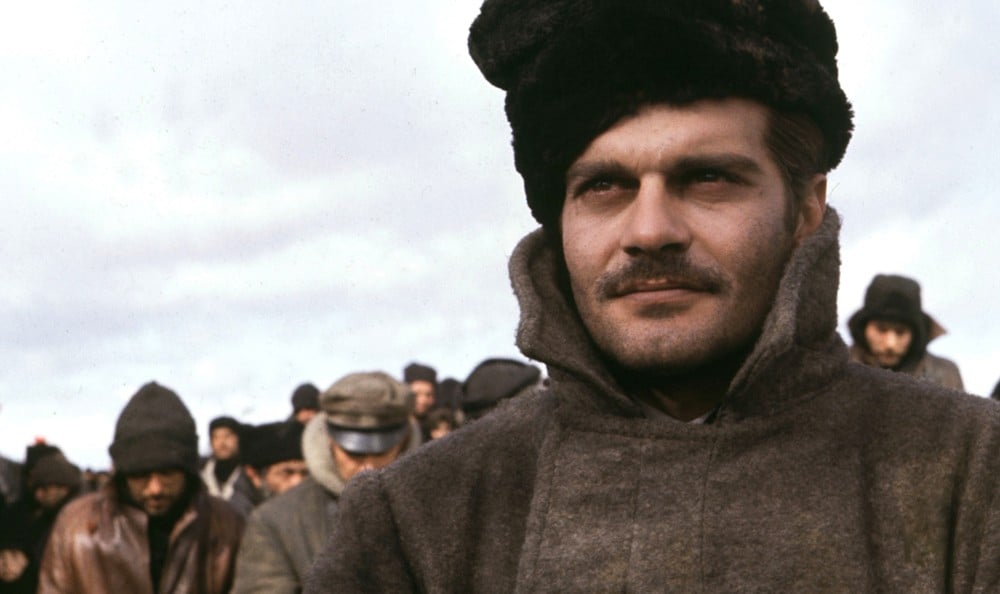
Omar Sharif in Lawrence of Arabia as well as in Doctor Zhivago is hailed as the one who conquered the white man’s domain

There were three reasons to see the film Lawrence of Arabia. First it was about T.E. Lawrence -- the arch enemy of the Muslims who conspired to make possible and successfully launch the Arab revolt against the Turks, therefore creating a rift between Muslim brethren, resulting in the winding up of the Khilafat; second, it had a Pakistani in the cast -- Zia Mohyeddin; and third, it also had a role being played by an Egyptian -- it was assumed by his name Omar Sharif that he was a Muslim.
It was yet again a Christian conspiracy to make a hero out of a villain and turn the knife in the wounds.
The Muslims of the Indian subcontinent have always seen the Muslim community, ummat, as it was known earlier in India or ummah as it is called now under Arab influence as some kind of a monolith -- and that the entire world had ever been and will conspire against this haloed community. They did not see the deep divisions within this ummah and refused to recognise that the Arabs really hated the Turkish colonisation and wanted an end to the Ottoman Empire. For that the Arabs were willing to embrace even the devil, which they did.
There was a Pakistani in the cast of the film. It was a matter of great pride for a Pakistani to be in a Hollywood film, but it was trailed by the keen desire of other Pakistanis to know that he had not really made it. There was and is a certain deep-rooted satisfaction in failure or partial success of a fellow compatriot or fellow countryman.
The element of deep envy and intense pangs of jealousy when a Pakistani makes it while others are left out is partially allayed by lack of full achievement. Seene ki aag thandi ho gai when they saw the film and found that Zia Mohyeddin had landed with only a minor role in the film, if calculated by minutes of appearance on screen.
And then there was Omar Sharif, an Egyptian, who had made it to Hollywood and he was taken for a Muslim. A great feat by an Arab and a Muslim to have scaled the so-called high walls of Hollywood. Among the subcontinental Muslims there was that romance with the Arab, the desert, the wilderness, the camel, the date palm.
And then Omar Sharif appeared again in Doctor Zhivago. Boris Pasternak was a villain; he had been awarded the Noble Prize only because he had written a novel undermining the great revolution that took place in Russia. It was an imperialistic conspiracy against communism and hence the new egalitarian order that was to bring an era of non-exploitation and happiness to the world.
The decision to make it into a film, and that a blockbuster, the fears and apprehensions were as if confirmed. Few people read books but many more see films, so the proof of the propaganda was as if provided by the Imperialists themselves by selecting a mass medium.
In those days Hollywood blockbusters were not released immediately in poor countries like Pakistan, probably because of the costs involved. It was mostly on the second run that films were released and viewed by the people. Lawrence of Arabia was released probably in the late 1960s and Doctor Zhivago in the 1970s.
In the late 1960s, my friend Nazir Kamal had gotten hold of Lara’s Theme on an LP and it was played on a record player so many times that its groves had become furrows. After a class and a half at the Government College and endless daydreaming hours in the canteen, the musical score transported us to a fantasy world in those lazy afternoons at Loyalla Hall, a private hostel. We read parts of the novel and identified with the much-romanticised landscape of Russia, the primordial characters struggling to realise themselves, their love, pitted against circumstances, in the larger-than-life tragic endeavours.
Tolstoy and Dostoyevsky had made us infatuated with everything Russian but there was loyalty to the revolution too. We had to get over the guilt of being in love with Lara, a poor vulnerable woman in love with bourgeois luxuries but fatally attractive nonetheless, but hated Zhivago from the feudal elite, indecisive, dithering, who lost his title, privilege and property and hence despised the revolution.
Omar Sharif in Lawrence of Arabia as well as in Doctor Zhivago was hailed as the one who had conquered the white man’s domain.
Born Michel Demitri Chalhoub, probably a Christian belonging of the Orthodox Church he may have become a Muslim to marry Fateh Hamama, an Egyptian actress. Always a good reason for conversion.
Then he acted in Chengiz Khan, an oriental hero, and Che that fed our insatiable appetite of a romanticised revolutionary. The Night of the Generals was another matching of wits with Peter O Toole and Mayerling that moved labourously, but inevitably towards the deeply tragic.
We were not that concerned that he disappeared as soon as he had appeared for he had done his job. He had been a success at Hollywood and only that mattered. One did not care about the person, only the artiste, he vanished from the radar screen to be heard about only gambling in the casinos over his favourite bridge. From a millionaire to a pauper, he played out the role that is conceived of an artiste that is of burning the candles at both ends.